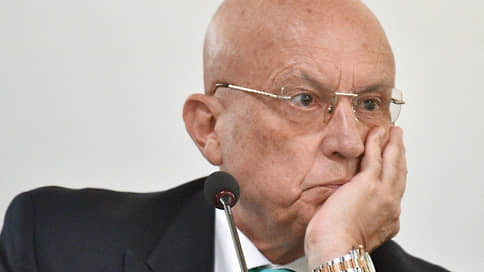Nuclear strike did not cause violations
[ad_1]

The HSE Academic Ethics Commission, having checked an article by Professor Sergei Karaganov on the need to use nuclear weapons to de-escalate the conflict in Ukraine, refused to evaluate the political scientist’s statements. University graduate Yulia Arkhipova and other representatives of the HSE community applied to the commission, according to whom the position of the scientist is contrary to ethics, and therefore should not be published with reference to the Higher School of Economics.
On June 13, Sergei Karaganov, Chairman of the Presidium of the Council on Foreign and Defense Policy and Academic Supervisor of the Faculty of World Economy and International Affairs at the Higher School of Economics, published an article titled “A Difficult But Necessary Decision” in Russia in Global Affairs magazine. The political scientist in it talked about the use of nuclear weapons as an opportunity to “save humanity from a global catastrophe.” “The appearance of nuclear weapons is the result of the intervention of the Almighty, who was horrified when he saw that people, Europeans and the Japanese who joined them, unleashed two world wars over the course of one generation, which claimed tens of millions of lives, and handed over to mankind the weapon of Armageddon, showed those who had lost their fear of hell, that it exists, the author is sure. The relative peace of the last three-quarters of a century rested on this fear. Now that fear is gone.” Mr. Karaganov is sure that the “fear of nuclear escalation” needs to be restored. In his opinion, Russia will have to return “the credibility of nuclear deterrence”: “The enemy must know that we are ready to deliver a preemptive strike of retaliation for all of its current and past aggressions in order to prevent the slide into a global thermonuclear war.” The scientist considers the possible use of nuclear weapons not only as a step towards the successful completion of the NWO, but also as the salvation of the whole world. “This is a morally terrible choice – we use the weapons of God, dooming ourselves to severe spiritual losses. But if this is not done, not only Russia may perish, but, most likely, the entire human civilization will end,” the article says.
The publication of Sergei Karaganov caused a heated discussion in society. For example, Alexei Arbatov, Konstantin Bogdanov, and Dmitry Stefanovich, experts from the Center for International Security at IMEMO RAS, sharply criticized this position in an article for Kommersant, talking about the possible consequences of using nuclear weapons: from strategic and political to biomedical and environmental.
HSE graduate Yulia Arkhipova, in turn, appealed to the university’s ethics commission, asking them to check Mr. Karaganov’s publication for compliance with local standards and the Charter (code of ethics) of the university. “When the article itself was just published, there were a lot of such indignant reposts, including from former students and teachers of the Higher School of Economics. One of them suggested writing to the ethics commission,” she said. “I thought it was a great idea, because in 2020 the commission disciplined the teacher Oleg Matveychev, who called for the return of the 37th year (on social networks, Mr. Matveychev suggested sending “liberal bastard” on uranium mines – the ethical commission came to the conclusion that his such statements threaten the reputation of the university.— “b”)”.
A number of other former HSE students and staff joined in Yulia Arkhipova’s appeal. “Many media outlets and users of social networks saw in the text calls for the Russian Federation to use nuclear weapons at facilities located on the territories of other states,” Ms. Arkhipova explained. The position of the professor, she is convinced, is contrary to ethics and can cause “serious reputational damage” to the university. Yulia Arkhipova’s claim is related to the fact that in the initial version of the publication, Mr. Karaganov indicated his affiliation with the Higher School of Economics: as of June 13, 2023, there was no note that the author’s position “is the personal opinion of the employee and does not reflect the position of the university.” “For me, the article violates ethics precisely because, in fact, the author proposes to commit a terrorist act. According to the Criminal Code of the Russian Federation, a terrorist act is “the commission of an explosion, arson or other actions that frighten the population and create a danger of human death … in order to destabilize the activities of government bodies or international organizations or influence their decision-making,” Ms. Arkhipova explained to Kommersant .
On July 9, Natalia Yerpyleva, chairman of the Academic Ethics Committee of the HSE Academic Council, announced that this body had considered Ms. Arkhipova’s appeal. “The competence of the commission does not include issues of assessing the scientific reliability and practical applicability of the conclusions contained in scientific and analytical articles, no matter how sharply polemical they may be. On these issues, the commission recommends to you (Yulia Arkhipova.— “b”) apply to the scientific council operating in the journal (“Russia in Global Affairs”.— “b”),” said Mrs. Erpyleva.
Kommersant turned to Sergei Karaganov for a comment, but he did not discuss Mrs. Arkhipova’s appeal and the decision of the HSE ethics commission: “I won’t comment on such rubbish.”
The press service of the Higher School of Economics did not provide an operational comment on the decision of the commission to Kommersant either.
“The position of the author seems to me naive and utopian,” said Professor Alexander Razin, head of the Department of Ethics of the Faculty of Philosophy of Moscow State University. “As for the ethical assessment, it is negative from a general humanist position.”
It should be noted that after the publication of the article, Sergei Karaganov was included in the EU sanctions list.
[ad_2]
Source link








